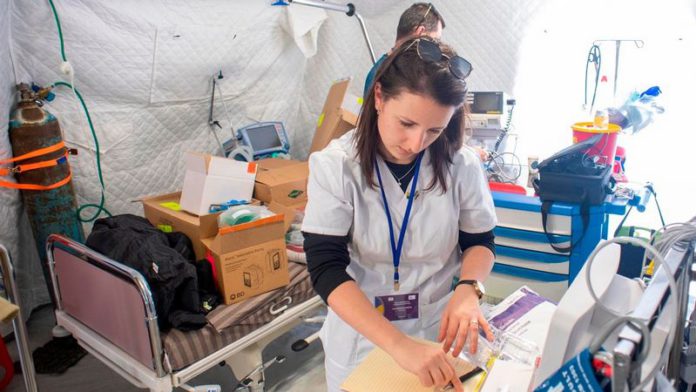
Medical experts are bracing for a flood of war-wounded and sick civilians fleeing the Ukraine frontline as Russia ’s shelling intensifies.
Moscow’s attacks on cities such as Mariupol has put hospitals under increased pressure and has led to a new field hospital being built in west Ukraine.
On Tuesday, officials opened Israel’s Shining Star field hospital, named after Kyiv-born former Israeli PM Golda Meir, in Mostyska, west Ukraine.
Israeli trauma surgeon Dr Adam Lee Goldstein, 42, told the Daily Mirror: “We may not be in the middle of the war-zone here but inevitably the wounded will arrive.
“It is likely that the situation in the east will get worse so we should expect people wounded in the war to come here and we are ready to receive and treat them.
“But we can also treat anyone who is ill or pregnant here. We can stop bleeds, perform general surgery, treat hernia, everything that comes our way.”
The hastily-constructed tent complex includes X-ray rooms, labour and birth facilities for desperate and pregnant women to have their babies, away from the frontline.
Adult men, women and children were being treated at the Israeli-funded treatment centre within hours of it opening in Mostyska, south west of Lviv.
Crucial medical check-ups were being performed remotely -with specialists giving their diagnosis from 2,000 miles way in hospitals back in Israel.
The £6 million field hospital was opened on Tuesday after 17 tons of life-saving medical equipment was airlifted into the war-zone via Poland.
Doctors can also access specialist medical practitioners throughout Israel using hi-tech monitors which can remotely diagnose health issues.
Dr Galina Barkei, 52, runs the Shining Star’s “Tele-medecine” tent, where using Israeli technology patients can be examined by specialists all over Israel, 2,000 miles away.
She said: “This technology means our specialists do not need to be here and can perform normal duties back in Israel.
“It is very possible somebody wounded in the war on the frontline could be treated in this way and it is also possible if there are major issues they could go to Israel.”
In her tent are devices which can help a remote diagnosis of anything from ear infections needing anti-biotics treatment to heart disease, breathing issues and pregnancy complications.
And there are psychology experts ready to offer help to people suffering from mental trauma from war.
An hour after the hospital opened we met shop assistant Ilyann, 42, and her musician daughter Julia, 24, who have fled to Mostyska to escape the war in Donetsk.
They had joined a small queue outside the hospital which has overnight beds for 60 people, 20 children, 20 women and 20 men but can process hundreds a-day.
Julia, who has withstood the noise and sights of war for the past eight years in and around her community, said: “I have some psychological problems.
“It started in 2016 and now I hear voices from time to time.
“It makes me feel ill and I need to talk to the doctors.”
